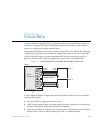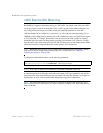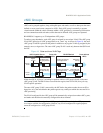
BMD00220, October 2010 151
CHAPTER 11
Virtualization
Virtualization allows resources to be allocated in a fluid manner based on the logical needs of the
data center, rather than on the strict, physical nature of components. The following virtualization
features are included in BLADEOS 6.5 on the RackSwitch G8124 (G8124):
Virtual Local Area Networks (VLANs)
VLANs are commonly used to split groups of networks into manageable broadcast domains,
create logical segmentation of workgroups, and to enforce security policies among logical
network segments.
For details on this feature, see “VLANs” on page 87.
Port trunking
A port trunk pools multiple physical switch ports into a single, high-bandwidth logical link to
other devices. In addition to aggregating capacity, trunks provides link redundancy.
For details on this feature, see “Ports and Trunking” on page 101.
Virtual Network Interface Card (vNIC) support
Some NICs, such as the Emulex Virtual Fabric Adapter, can virtualize NIC resources,
presenting multiple virtual NICs to the server’s OS or hypervisor. Each vNIC appears as a
regular, independent NIC with some portion of the physical NIC’s overall bandwidth.
BLADEOS 6.5 supports up to four vNICs over each server-side switch port.
For details on this feature, see “Virtual NICs” on page 153.
VMready
The switch’s VMready software makes it virtualization aware. Servers that run hypervisor
software with multiple instances of one or more operating systems can present each as an
independent virtual machine (VM). With VMready, the switch automatically discovers virtual
machines (VMs) connected to switch.
For details on this feature, see “VMready” on page 165.
BLADEOS virtualization features provide a highly-flexible framework for allocating and managing
switch resources.


















